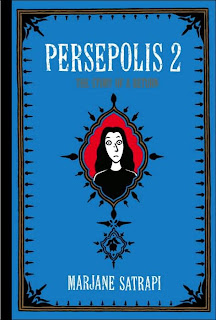 I just finished reading Persepolis 2 by Marjane Satrapi. I'd read the first volume a while back and really liked it, but I just never got around to looking at this one. These two books form a memoir of Satrapi's childhood and early adulthood; she grew up in Iran, then left when the political regime there became too oppressive. There's also a movie based on the memoir, and I am going to watch it as soon as I get myself together. For people who have not read the books and want to start, you can get The Complete Persepolis, which combines the two volumes in one.
I just finished reading Persepolis 2 by Marjane Satrapi. I'd read the first volume a while back and really liked it, but I just never got around to looking at this one. These two books form a memoir of Satrapi's childhood and early adulthood; she grew up in Iran, then left when the political regime there became too oppressive. There's also a movie based on the memoir, and I am going to watch it as soon as I get myself together. For people who have not read the books and want to start, you can get The Complete Persepolis, which combines the two volumes in one.Persepolis 2 focuses on the author's adolescence and young adulthood. She goes to Europe to boarding school, then returns home to do other things. As in the first book, the drawings are simple but distinctive, with the color black used to great effect in the robes/head coverings of the women. All that solid black ends up being very imposing/forboding on the page. These two books throughout do a great job of getting rid of the myth that Iranian society is either simple or unified--instead, we are shown varying perspectives on the regime, and varying attitudes toward its religious/moral dictums. The author's family is modern and progressive, very intellectual and very much against the regime--and yet they also love Iran and are proud of its history and traditions even as they grieve for what it has become. This memoir does a great job of showing a complicated relationship to one's homeland, and the author's tumultuous escapes from and returns to it highlight that fact. She has a troubled, difficult adolescence made moreso by the fact that the government of her own country is the most repressive and horrible parent of all.
Anyway, the two volumes together make for a great memoir, and I'm glad to have read it. I wonder if a third volume is forthcoming. I'd recommend that people who believe Iran is unified behind its oppressive policies read it, because Persepolis definitely shows that the reality of the relationship between the citizens and the country is far more complicated than that.
No comments:
Post a Comment